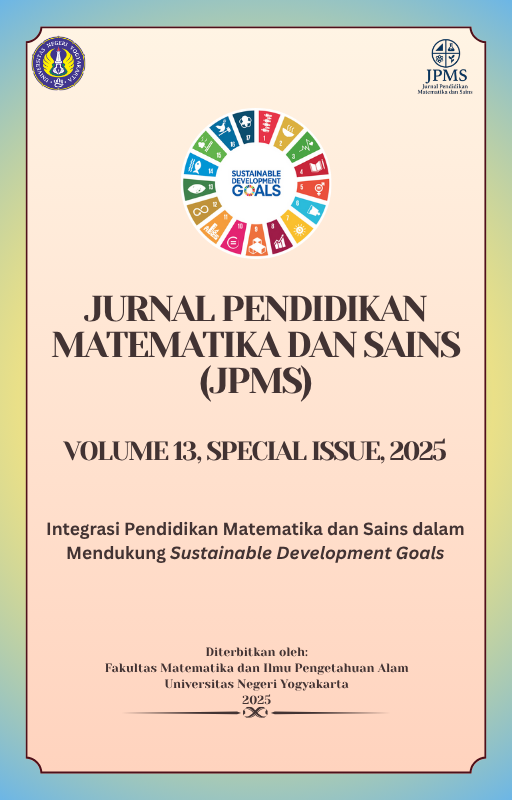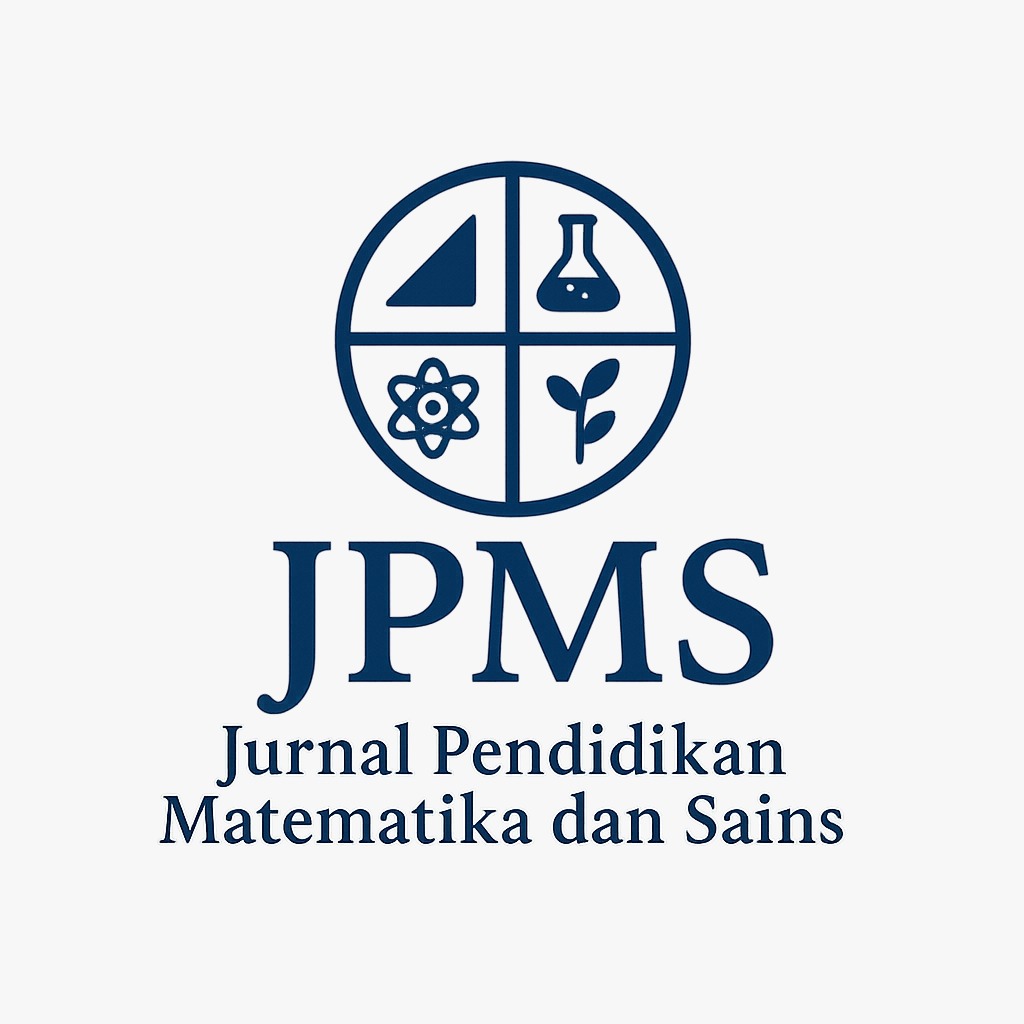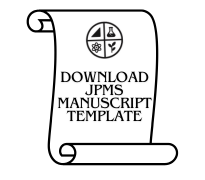Pengaruh Pembelajaran Inkuiri Terbimbing Terintegrasi Simulasi Komputer pada Materi Elektrolit dan Non Elektrolit Terhadap Prestasi Kognitif dan Efikasi Diri
DOI:
https://doi.org/10.21831/jpms.v13iSpecial_issue.89228Keywords:
Inkuiri Terbimbing, Prestasi Kognitif, Efikasi DiriAbstract
Penelitian ini bertujuan untuk menganalisis erbedaan prestasi kognitif dan efikasi diri antara siswa yang menggunakan model pembelajaran inkuiri terbimbing didukung simulasi komputer dengan siswa yang menggunakan model discovery learning dan persentase sumbangan positif model pembelajaran inkuiri terbimbing didukung simulasi komputer terhadap prestasi kognitif dan efikasi diri siswa. Penelitian ini menggunakan jenis desain quasi eksperimen dengan sampel sebanyak 105 siswa dari seluruh siswa SMA di Aceh bagian utara dengan akreditasi B dan menggunakan cluster random sampling. Instrumen yang digunakan berupa tes prestasi kognitif dan angket efikasi diri. Teknik analisis data menggunakan uji MANOVA. Hasil penelitian menunjukkan jika terdapat perbedaan yang signifikan pada efikasi diri, namun tidak terdapat perbedaan signifikan pada prestasi kognitif siswa antara kelas kontrol dan eksperimen. Hasil sumbangan positif terhadap prestasi kognitif dengan kategori kecil (2,7%); efikasi diri dengan kategori sedang (10,4%). Model inkuiri terbimbing didukung dengan simulasi komputer dapat meningkatkan prestasi kognitif dan efikasi diri agar dapat mendukung ketercapaian SDGs khususnya pilar ke-4 tentang pendidikan berkualitas.
References
Alfitry, S. (2020). Model discovery learning dan pemberian motivasi dalam pembelajaran. Jawa barat: Geupedia.
Cohen, J. (2013). Statistical power analysis for the behavioral sciences. routledge.
Conrad, A.W., & Kowalske, M, G. (2017). Using self-efficacy beliefs to understand how students in a general chemistry course approach the exam process. Chemistry Education Research and practice, 265-275.
Dewi, R., Supriyanti, F.M.T., & Dwiyanti, G. (2016). Analisis penguasaan konsep larutan elektrolit-nonelektrolit siswa menggunakan siklus belajar hipotesis deduktif. Educhemia, 1(2), 98-109
Dunn, J., & Ramnarain, U. (2020). The effect of simulation-supported inquiry on south african natural sciences learners’ understanding of atomic and molecular structures. Education sciences. 10(10): 280.
De Jong, T. (2006). Computer simulations: Technological advances in inquiry learning. EducationForum, 1.
Eckhardt, M., Urhahne, D., Conrad, O., & Harms, U. (2013). How effective is instructional support for learning with computer simulations?. Instructional Science, 41(1), 105-124.
Espinoza, F. (2020). Impact of guided inquiry with simulations on knowledge of electricity and wave phenomena. arXiv preprint arXiv:2012.05826.
Haatainen, O., Turkka, J., & Aksela, M. (2021). Science teachers’ perceptions and self-efficacy beliefs related to integrated science education. Education Sciences, 11(272), 1-20.
Haryadi, D.N., & Nurhayati, S. 2015. Penerapan model learning start with a question berpendekatan ICARE pada hasil belajar. Jurnal Inovasi Pendidikan Kimia, 9 (2), 1528-1537.
Husnaini, S. J., & Chen, S. (2019). Effects of guided inquiry virtual and physical laboratories on conceptual understanding, inquiry performance, scientific inquiry self-efficacy, and enjoyment. Physical Review Physics Education Research, 15(1), 010119.
Isrok’atun & Rosmala, A. (2018). Model-model pembelajaran matematika. Jakarta: Bumi Aksara.
Lakens, D. (2013). Calculating and reporting effect sizes to facilitate cumulative science: a practical primer for t-tests and ANOVAs. Frontiers in psychology, 4, 863.
Lianto. (2019). Self-efficacy: a brief literature review. Jurnal Manajemen Motivasi, 15, 55-61
LTMPT. (2020). Evaluasi Ujian Tulis Berbasis Komputer Seleksi Bersama Masuk Perguruan Tinggi Negeri (UTBK SBMPTN) 2020. Jakarta: Lembaga Tes Masuk Perguruan Tinggi.
Makransky, G., Thisgaard, M. W., & Gadegaard, H. (2016). Virtual simulations as preparation for lab exercises: Assessing learning of key laboratory skills in microbiology and improvement of essential non-cognitive skills. PloS one, 11(6), e0155895.
Marwanti, K., Marina, D., & Astra, I. M. (2024). Increasing Scientific Literacy using a Guided Inquiry Approach assisted by PhET Simulations in Wave Material. Jurnal Penelitian Pembelajaran Fisika, 15(4), 355-360.
Muslimin, M., & Purwaningsih, E. (2023). Meta-Analisis: Pengaruh LKPD berbasis PBL terhadap Kemampuan Berpikir Kritis dan Pemecahan Masalah dalam Fisika. Jurnal Pendidikan Matematika Dan Sains, 11(2), 38-45.
Najib, M. N. M., Md-Ali, R., & Yaacob, A. (2022). Effects of PhET interactive simulation activities on secondary school students’ Physics achievement. South Asian Journal of Social Science and Humanities, 3(2), 73-78.
Pratama, F. I., & Rohaeti, E. . (2023). Students’ Chemical literacy ability on hydrocarbon material: A case of toxic compounds in fried food. Jurnal Penelitian Pendidikan IPA, 9(9), 6795–6802. https://doi.org/10.29303/jppipa.v9i9.4554
Pratama, F. I., Rohaeti, E., & Laksono, E. W. (2025). Building sustainable education with the literacy and research-oriented cooperative problem-based learning: A bridge in the activeness of chemistry education students. Jurnal Pendidikan Matematika Dan Sains, 13(Special_issue), 61–68. https://doi.org/10.21831/jpms.v13iSpecial_issue.88392
Puti, S., & Jumadi, J. (2015). Pengembangan modul IPA SMP berbasis guided inquiry untuk meningkatkan keterampilan proses dan sikap ilmiah. Jurnal Pendidikan Matematika dan Sains, 3(1), 79-90.
Rasyid, M.A., & Partana, C.F. (2021). Profil efikasi diri peserta didik sekolah menengah pada pembelajaran kesetimbangan kimia. Jurnal Zarah, 9(1), 54-59.
Sanjaya, W. (2006). Strategi pembelajaran. Jakarta: Kencana Prenada Media Group.
Stevens, J. P. (2002). Applied multivariate statistics for the social sciences. Mahwah, NJ: Lawrence Erlbaum Associates.
Thisgaard, M., & Makransky, G. (2017). Virtual learning simulations in high school: Effects on cognitive and non-cognitive outcomes and implications on the development of STEM academic and career choice. Frontiers in psychology, 8, 805.
UNESCO. (2020). Education for Sustainable Development: A Roadmap. Paris: UNESCO Publishing.
United Nations. (2015). Transforming our world: the 2030 Agenda for Sustainable Development. New York: United Nations.
Villafane, S.M., Garcia, C.A., & Lewis, J.E. (2014). Exploring diverse students’ trends in chemistry self-efficacy throughout a semester of college-level preparatory chemistry. Chemistry Education Research and Practice, 15(2), 114-127
Wibowo, T. H., Rudibyani, R, B., Efkar, T. (2015). Penerapan model inkuiri terbimbing dalam meningkatkan efikasi diri dan penguasaan konsep siswa. Jurnal Pendidikan dan Pembelajaran Kimia, 4(3), 947-959.
Widowati, A., Nurohman, S., & Setyowarno, D. (2017). Development of inquiry-based science virtual laboratory for improving student thinking skill of junior high school. Jurnal Pendidikan Matematika dan Sains, 4(2), 170-177.
Yusuf, A., Ischak, N.I., & Duengo, S. (2017). Kajian kemampuan pemahaman konsep larutan elektrolit dan nonelektrolit siswa kelas X IPA SMA Negeri 3 Gorontalo. Jurnal Entropi, 12(2), 187-191.
Downloads
Published
How to Cite
Issue
Section
Citation Check
License

This work is licensed under a Creative Commons Attribution-ShareAlike 4.0 International License.
Jurnal Pendidikan Matematika dan Sains allows readers to read, download, copy, distribute, print, search, or link to its articles' full texts and allows readers to use them for any other lawful purpose. The journal allows the author(s) to hold the copyright without restrictions. Finally, the journal allows the author(s) to retain publishing rights without restrictions
- Authors are allowed to archive their submitted article in an open access repository
- Authors are allowed to archive the final published article in an open access repository with an acknowledgment of its initial publication in this journal

This work is licensed under a Creative Commons Attribution-ShareAlike 4.0 Generic License.





